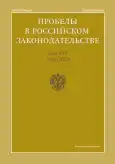On the Issue of Ways to Improve Legislation on Private Detective and Security Activities
- Авторлар: Alekseev S.N.1, Uvarov M.A.1, Remizov P.V.2
-
Мекемелер:
- Management Academy of the Ministry of Internal Affairs of Russia
- Nizhny Novgorod Academy of the Ministry of Internal Affairs of Russia
- Шығарылым: Том 16, № 8 (2023)
- Беттер: 83-89
- Бөлім: Public Law (State Law) Sciences
- URL: https://bakhtiniada.ru/2072-3164/article/view/251400
- EDN: https://elibrary.ru/PPZFYW
- ID: 251400
Дәйексөз келтіру
Аннотация
The purpose of the research. The scientific article examines significant areas for improving legislation on private detective and security activities, relating to: licensing of private detectives and security guards, as well as the qualification requirements for applicants for these statuses; the use of technical means by private detectives; interaction of private detectives and private security organizations with law enforcement agencies. The purpose of the study is to identify existing problems of legal regulation in this area, as well as to design the most effective ways to solve them. Conclusions. As a result of the study, a conclusion was made about the need for more intensive use of the potential of subjects of private detective and security activities to solve law enforcement problems. This requires a revision of the requirements for applicants for a license to carry out private detective activities, as well as the qualification requirements for employees of private security organizations. The scientific article also makes a number of proposals aimed at improving the interaction of private detectives and private security organizations with law enforcement agencies. The authors consider it necessary: to introduce a class approach to licensing private detectives; establish a list of technical and other means permitted in the activities of a private detective; increase the requirements for applicants for a license to carry out private detective and private security activities; review the existing procedure for the exchange of information and interaction between private detectives and the Russian Ministry of Internal Affairs.
Толық мәтін
##article.viewOnOriginalSite##Авторлар туралы
Sergey Alekseev
Management Academy of the Ministry of Internal Affairs of Russia
Хат алмасуға жауапты Автор.
Email: asn16031981@yandex.ru
Cand.Sci.(Law), Associate PRofessor, Associate Professor of the Department of Management of the Activities of Public Order Ensuring Units of the Center for Command and Staff Exercises
Ресей, MoscowMaxim Uvarov
Management Academy of the Ministry of Internal Affairs of Russia
Email: i@uvarovmaksim.ru
Cand.Sci.(Law), Associate Professor of the Department of Management of the Activities of Public Order Ensuring Units of the Center
Ресей, MoscowPavel Remizov
Nizhny Novgorod Academy of the Ministry of Internal Affairs of Russia
Email: pasha5225@yandex.ru
Cand.Sci.(Law), Deputy Head of the Department of Administrative Law and Process
Ресей, Nizhny NovgorodӘдебиет тізімі
- Babaytseva, E. A. Concept, legal nature and classification of the provision of detective services as an object of civil rights / E. A. Babaytseva // Lawyer. – 2019. – № 2. – P. 41-49.
- Dontsenko, D. A. The role and place of non-state security structures in the country’s anti-terrorism security system / D. A. Dontsenko // Power. – 2019. – № 3. – P. 114-120.
- Dudkin, D. A. The relationship between the provision of detective services and the provision of private security services and the actions of law enforcement agencies in the field of detective and security / D. A. Dudkin // Russian investigator. – 2022. – № 9. – P. 63-67.
- Zanina, T. M. Features of the implementation of the powers of the licensing and permitting departments of the Russian Guard in the field of private security activities / T. M. Zanina, A. S. Radzhabova // Administrative law and process. – 2022. – № 2. – P. 41-44.
- Mikheeva, I. V. Principles of legal regulation of licensing procedures as the basis of effective public administration / I. V. Mikheeva // Russian Legal Journal. – 2019. – № 2. – P. 8-14.
- Smolkova, I. V. Is a private detective a participant in criminal proceedings? / I. V. Smolkova // Russian investigator. – 2019. – № 9. – P. 26-30.
- Tishchenko, Yu. Yu. Some issues of legal regulation of citizens’ assistance to bodies carrying out operational investigative activities / Yu. Yu. Tishchenko // Criminal enforcement system: law, economics, management. – 2019. – № 3. – P. 28-30.
- Trifonova, E. Private detectives are looking for a place in the process / E. Trifonova // Nezavisimaya Gazeta. – 2022. – March 17.
- Fisun, A. V. On the place of the private detective in the modern criminal process in Russia / A. V. Fisun // International Journal of Humanities and Natural Sciences. – 2020. – № 12-3. – Pp. 204-205.
- Shenshin, V. M. Improving the legal regulation of control exercised by the Russian Guard over the activities of private security organizations / Shenshin V. M., Faiskhanov R. R. // Russian Justice. – 2020. – № 9. – P. 52-54.
Қосымша файлдар








